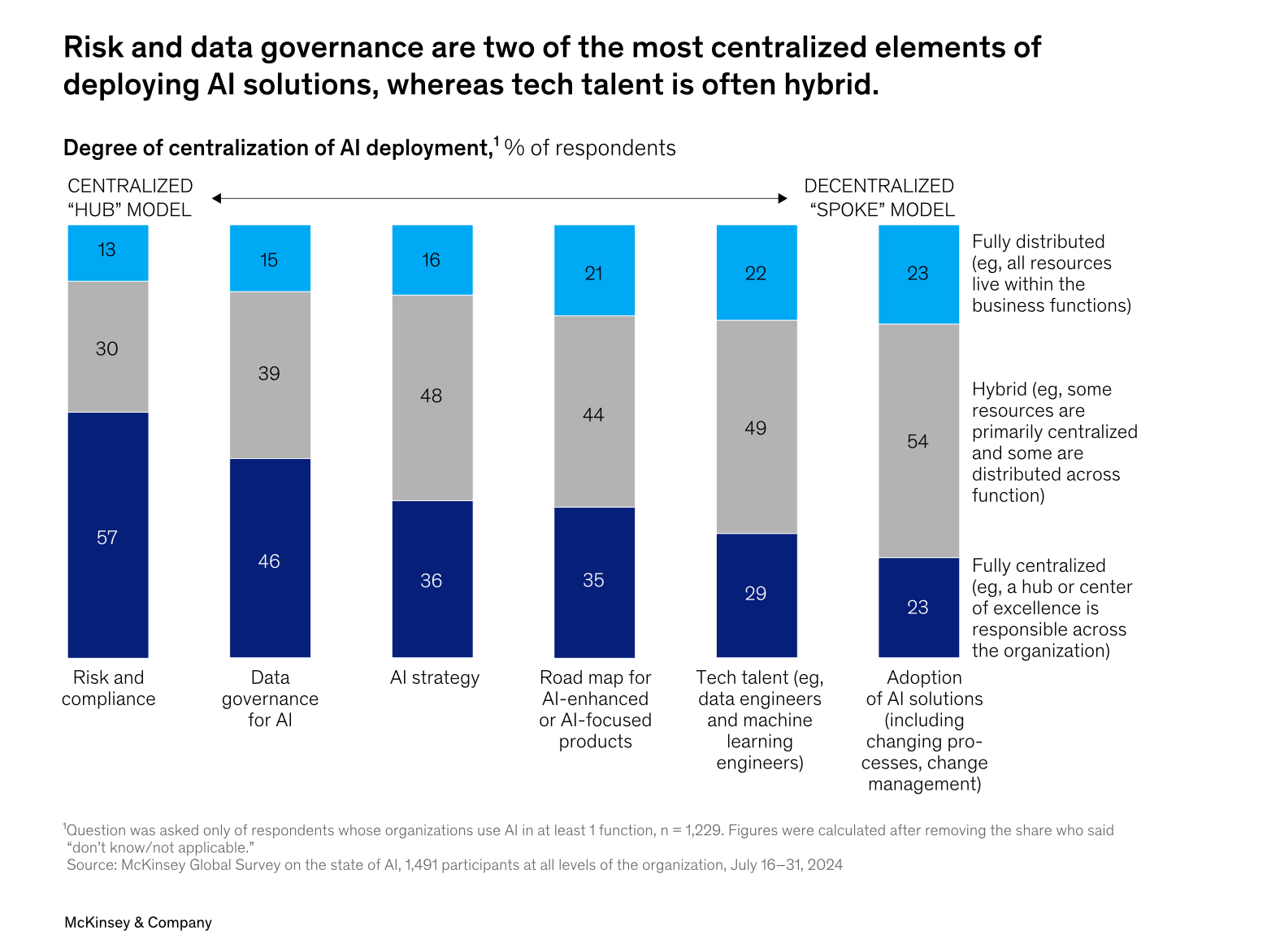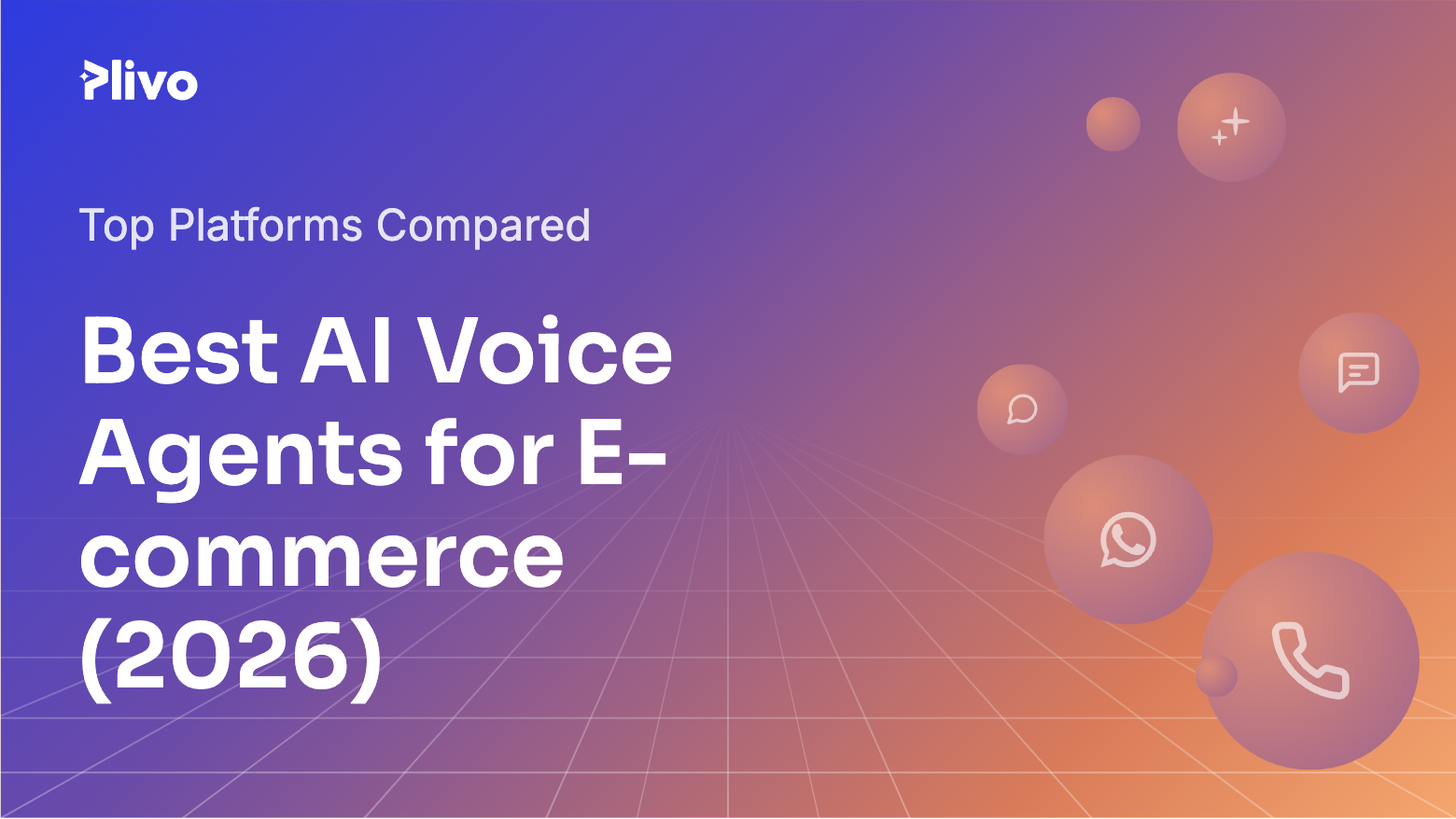Accenture’s 2024 report indicates that 74% of organizations say their investments in generative AI and automation have met or exceeded expectations. Even more telling, 63% plan to increase that investment by 2026.
This sends a clear signal: AI is paying off.
Now the question is, are you using it to its full potential? Or are outdated systems slowing your team down?
To help you get a full overview of the current landscape, we have handpicked top customer service stats from McKinsey, PwC, Gartner, and other credible sources. You’ll see exactly where AI agents deliver results and how Plivo helps you act on them.
Top AI agent statistics
AI agents are changing how you deliver customer service. But how much impact are they really making?
To help you make smarter decisions, we’ve broken down the latest statistics into seven key categories. Each one highlights where AI agents impact, from adoption and performance to ROI, customer preferences, and challenges.
Growth of AI agents in customer service
More companies are deploying AI agents to reduce wait times, cut support costs, and scale faster. Let’s look at the numbers showing how fast AI adoption is accelerating:

- The AI agents market was valued at $3.7 billion in 2023 and is projected to reach $103.6 billion by 2032, growing at a CAGR of 44.9% from 2024 to 2032 (S&S Insider)
- 63% of top-performing companies plan to increase cloud budgets by 6% or more (PwC)
- 85% of enterprises are using AI in 2025 (Wiz)
- By 2025, 80% of companies will have adopted or plan to adopt AI-powered chatbots to support their customer service operations (Gartner)
- As of early 2025, 78% of organizations are using AI in at least one business function, up from 72% in early 2024, showing steady growth in AI adoption across industries (McKinsey)
- 78% of respondents report using AI in at least one business function, a rise from 72% in early 2024 and 55% the year before, showing rapid growth in AI adoption(McKinsey)

- The share of companies running fully AI-led operations jumped from 9% in 2023 to 16% in 2024. These businesses are seeing 2.4 times higher productivity and developing more effective retention strategies (Accenture)
- By 2029, AI agents will autonomously resolve 80% of common customer service issues, eliminating the need for human intervention in most routine cases (Gartner)
- 63% of retail organizations report using generative AI to enhance their existing customer service efforts (Capgemini)
- Organizations are turning to AI to drive top-line growth and stand out from competitors. 42% aim to improve product or service quality, while 39% are focused on boosting revenue. At the same time, they’re using AI to enhance operations—40% to increase workforce productivity, 41% to improve IT efficiency, and 39% to speed up innovation (Weka)
Use cases: where AI agents are creating impact
If you think AI has limited use, these stats will shift your perspective:

- Automating just up to 20% of support tickets can lead to an 8-point increase in repeat purchase rates within 28 days (Gorgias)
- Automated responses resolve some tickets instantly and help teams respond faster overall. On average, merchants using automation reply 37% faster than those who don’t (Gorgias)
- Merchants who automate customer tickets resolve them 52% faster than those who don’t, showing how AI significantly speeds up support (Gorgias)
- AI agents will cut the time needed to exploit account exposures by 50%, emphasizing the importance of AI in both defense and risk response by 2027(Gartner)
- Organizations using Gen AI–enabled customer service agents saw a 14% increase in issue resolution per hour and a 9% reduction in time spent handling issues (McKinsey)
Performance metrics that matter
AI agents now match or exceed human benchmarks in speed, accuracy, and resolution rates. But how do they actually perform under pressure? These numbers tell you what to expect and where to set your goals:

- 72 % of top-performing companies have seen increased productivity by implementing AI (PwC)
- Using generative AI tools boosts user performance by 66% on average. The biggest gains come from complex tasks, with less-skilled workers seeing the most improvement (Nelisen Norman Group)
- Conversational AI in contact centers will cut agent customer service operations costs by $80 billion by 2026. In 2022, global end-user spending on these solutions reached $1.99 billion, showing substantial investment in automation (Gartner)
- Among leading generative AI adopters, the majority report a high or very high impact on key business areas: 79% say it boosts innovation, 76% say it supports new product launches, and 76% see faster time to market—all contributing to stronger competitive positioning (Weka)
- Customer support agents using a generative AI assistant boosted their productivity by 14% on average (NBER)
- Workers are, on average, 33% more productive during each hour they use generative AI (Federal Reserve Bank of St. Louis)
AI agent ROI and cost efficiency
Businesses are saving millions in overhead while improving support outcomes. Want to know how much ROI you could unlock with AI agents? These stats break it down:

- Support agents using AI tools can manage 13.8% more customer inquiries per hour, boosting productivity without the need to hire more staff (Nielsen Norman Group)
- Generative AI and related technologies could automate tasks that currently take up 60 to 70% of employees’ time, significantly changing how work gets done (McKinsey)
- AI-powered systems have led to a 31.5% boost in customer satisfaction scores and a 24.8% increase in customer retention, showing clear gains in both experience and loyalty (ResearchGate)
- Companies using generative AI are 35% less likely to report that human agents feel overwhelmed by the amount of information during customer calls (Deloitte)
- 9 in 10 of organizations using AI report saving both time and money. Service operations professionals are especially optimistic, nearly all believe generative AI will improve their company’s customer service (Salesforce)
- 1 in 3 companies with omnichannel integration tools resulted in 9% lower cost per assisted contact (Deloitte)
AI agents + human agents: The hybrid advantage
The best support teams blend human empathy with AI efficiency. AI agents handle volume. Human agents step in for nuance. These figures show what’s working and where companies get it wrong:

- 71% of customers believe it is important for a human to validate the output of AI (Salesforce)
- Today, 54% of workers worldwide trust humans and AI to work together on most tasks, highlighting the need for businesses to implement AI responsibly and in ways that earn user trust(Salesforce)
- Among organizations using generative AI, 27% say their employees review all AI-generated content before it’s used, whether it’s a chatbot response for a customer or an image for marketing (McKinsey)
- While 68% of people have used automated customer service chatbots, 88% still prefer speaking with a human when they need support, highlighting the ongoing importance of human interaction (Ipsos)
- 87% of executives believe generative AI will augment jobs rather than replace them, suggesting most roles will evolve with AI support instead of being automated away (IBM)
- Executives can drive AI adoption by showing employees that the goal is to add value, not just cut costs. Companies that foster a culture of experimentation and don’t penalize failure see a 10% boost in revenue growth during tech adoption. Among AI users, those with this open mindset achieve a 22% higher revenue growth rate than those who don’t (IBM)
AI Agents and Customer Preferences
Customers care about fast, helpful answers, not who gives them. But preferences still matter. You’ll want to see what real users are saying before making your next CX decision:

- 28% of respondents have used AI-powered visual search to find products that look like what they’re interested in purchasing (BCG)
- Nearly 24% of consumers are already comfortable with AI agents making purchases on their behalf, and that number rises to 32% among Gen Z shoppers (Salesforce)
- About one in three consumers prefer to buy products through automated or digital channels, such as AI agents, rather than interacting with a person (Salesforce)
- Some of the top reasons for customers interacting with AI include better availability (41%), faster issue resolution (37%), and more accurate information (30%) (SurveyMonkey)
- 52% of consumers are interested in using AI to guide them through a product, website, or feature. 47% want personalized deals based on their purchase history, and 42% are interested in AI-driven product recommendations (SurveyMonkey)
- 89% of customers say it’s important to know whether they’re interacting with a human or an AI, highlighting the need for transparency in customer support (Salesforce)
Challenges & considerations
If you’re thinking about scaling AI, you need to know what could go wrong and how others navigate it. These stats show the friction points worth planning for:

- 92% of analytics and IT leaders say that the demand for trustworthy data is at an all-time high, especially as AI becomes more central to decision-making (Salesforce)
- 61% of workers are open to using generative AI, but many still lack access to reliable data and the security skills needed to use it effectively (Salesforce)
- Nearly 64% of organizations express concern about how AI and machine learning projects affect their energy consumption and carbon footprint. 25% say they are very concerned (Weka)

- 35% of organizations cite storage and data management as the top infrastructure barriers to AI adoption. However, those with widespread AI implementation report fewer issues in these areas (Weka)
- 37% of the U.S. IT leaders see data quality as a major obstacle to AI success (Hitachi Vantara)
- 40% of employees will need retraining due to AI adoption, underscoring the need for ongoing learning and strong human oversight (IBM)
Experience next-gen AI-driven engagement with Plivo
The data speaks for itself—AI agents are no longer optional. They mean faster resolutions, lower costs, and higher satisfaction. But success depends on choosing the right partner.
Plivo is an all-in-one omnichannel customer service platform that helps you deploy open AI-powered AI agents that actually perform. No overpromises. Just faster responses, fewer escalations, and better CX.
With Plivo, you get:
- AI agents for instant support: Handle FAQs, status checks, and call routing automatically, reducing agent load and response times 24/7
- Metrics & reporting: Get live insights into call volume, handle time, and team performance
- Smart, context-rich escalations: Transfer complex issues to human agents with full conversation history. No repeated questions, no friction
- Easy integrations: Connect Plivo to your CRM, helpdesk, and other tools without heavy dev work
- Flexible scalability: Whether you’re supporting 10 users or 10,000, Plivo adapts to your scale and needs
- Workflow automation: Automate follow-ups, ticket routing, and updates to keep customers informed without manual effort
- Enterprise-grade security: Built with SOC 2 and GDPR compliance to keep your data safe and your business trustworthy
Want to see how AI agents transform your support strategy? Book a demo now.









